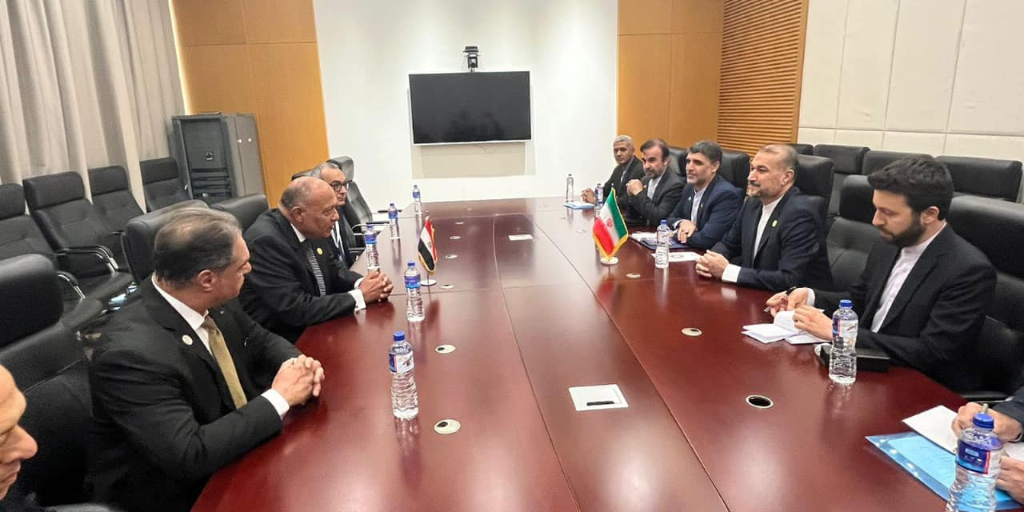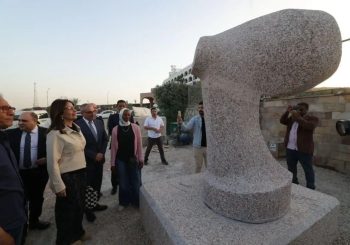Egypt’s Minister of Foreign Affairs Sameh Shoukry held talks with his Iranian counterpart, Hossein Amir-Abdollahian, during a sideline meeting at the Islamic Summit Conference in Gambia.
A social media statement posted on 4 May recounts the talking points of the meeting, reported ministry spokesperson Ambassador Ahmed Abu Zeid.
The talks primarily focused on agenda items of the Islamic Summit, emphasising the importance of solidarity and unity among Islamic nations amidst significant global challenges.
Amongst the agenda of the conference was the ongoing war on Gaza, with both Shoukry and Amir-Abdollahian condemning Israel’s persisting military attacks on Rafah – the largest safe zone for displaced Palestinians with a refugee population of over one million.
On his part, Shoukry also highlighted Egypt’s efforts to secure a ceasefire to facilitate prisoner exchanges and ultimately achieve a comprehensive and permanent cessation of hostilities.
In addition to urging an immediate ceasefire and the uninterrupted delivery of urgent humanitarian aid, both ministers stressed the importance of encouraging countries to recognise the need for an independent Palestinian state.
The meeting also addressed bilateral relations between Egypt and Iran, as both governments gradually improve diplomatic relations through reoccurring meetings.
IRAN’S INSISTENCE TO RESTORE REGIONAL RELATIONS
The historical relationship between the two states has been turbulent since the mid-twentieth century. While diplomatic ties were maintained, ideological differences often strained the two states’ relations.
In the 1970s, under Egyptian president Anwar Sadat, Egypt shifted towards a more Western-oriented foreign policy – bringing it closer to Tehran’s monarchy at the time. It served only as a brief moment of friendship, however, as the establishment of the Islamic Republic in 1979 strained relations again.
Ties were formally severed following Egypt’s endorsement of Iraq in the Iraq-Iran War in 1980.
Diplomatic relations hit another low when Iran expressed support for Muslim Brotherhood party leader Mohamed Morsi shortly after the 2011 – an Islamist political group categorised as a terrorist organisation by the current Egyptian government.
Over the decade, Iran expressed its willingness to enter a restorative era of regional relations with several states – adding to their extensive relations with Iraq, Syria, Lebanon, Oman, Algeria, Qatar, and Tunisia.
On a larger scale, Iran’s actions are indicating a diplomatic shift not just in the region but in the global political arena.
Saudi Arabia’s agreed reconciliation with Iran on 11 March 2034 opens the possibility for further de-escalation across the region – with both sides previously embroiled in a proxy conflict in Yemen, Syria, and Iraq.
Iran is now directing its efforts towards Egypt, intending to resume full diplomatic ties. Following Khamenei’s public endorsement of a detente, Iran’s President Ebrahim Raisi ordered the country’s foreign minister to pursue the matter “with seriousness.”
Since then, Egyptian President Abdel Fattah Al-Sisi and Shoukry have held talks with Iranian delegations as communication between the two countries continues to progress.
Subscribe to the Egyptian Streets’ weekly newsletter! Catch up on the latest news, arts & culture headlines, exclusive features and more stories that matter, delivered straight to your inbox by clicking here.







Comments (0)